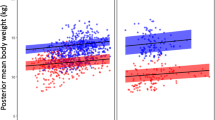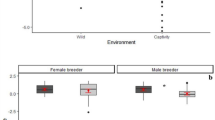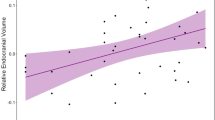Animals that roam over a large territory in the wild do not take kindly to being confined.
Abstract
Some species — ring-tailed lemurs and snow leopards, for example — apparently thrive in captivity, whereas others, such as Asian elephants and polar bears, are prone to problems that include poor health, repetitive stereotypic behaviour and breeding difficulties. Here we investigate this previously unexplained variation in captive animals' welfare by focusing on caged carnivores, and show that it stems from constraints imposed on the natural behaviour of susceptible animals, with wide-ranging lifestyles in the wild predicting stereotypy and the extent of infant mortality in captivity. Our findings indicate that the keeping of naturally wide-ranging carnivores should be either fundamentally improved or phased out.
This is a preview of subscription content, access via your institution
Access options
Subscribe to this journal
Receive 51 print issues and online access
$199.00 per year
only $3.90 per issue
Buy this article
- Purchase on Springer Link
- Instant access to full article PDF
Prices may be subject to local taxes which are calculated during checkout

Similar content being viewed by others
References
Mason, G., Cooper, J. & Clarebrough, C. Nature 410, 35–36 (2001).
Dawkins, M. S. Appl. Anim. Behav. Sci. 20, 209–225 (1988).
Robbins, T. W., Jones, G. H. & Wilkinson, L. S. J. Psychopharmacol. 10, 39–47 (1996).
Lewis, M. H., Gluck, J. P., Bodfish, J. W., Beauchamp, A. J. & Mailman, R. B. in Stereotyped Movements (eds Sprague, R. L. & Newell, K. M.) 37–67 (Am. Psychol. Assoc., Washington DC, 1996).
Clubb, R. E. The Roles of Foraging Niche, Rearing Conditions and Current Husbandry on the Development of Stereotypies in Carnivores (Thesis, Univ. Oxford, 2001).
Meier, J. in Zoo and Wild Animal Medicine (ed. Fowler, M. E.) 842–851 (Saunders, Philadelphia, 1986).
Shepherdson, D. J., Mellen, J. D. & Hutchins, M. (eds) Second Nature: Environmental Enrichment for Captive Animals (Smithsonian Inst. Press, Washington DC, 1998).
Gittleman, J. L. & Harvey, P. H. Behav. Ecol. Sociobiol. 10, 57–63 (1982).
Gittleman, J. L. J. Mamm. 67, 23–36 (1986).
Purvis, A. & Rambaut, A. Comp. Appl. Biosci. 11, 247–251 (1995).
Bininda-Emonds, O. R. P., Gittleman, J. L. & Purvis, A. Biol. Sci. 74, 143–175 (1999).
Bahr, N. I., Pryce, C. R., Döbeli, M. & Martin, R. D. Physiol. Behav. 64, 429–437 (1998).
Woodroffe, R. & Ginsberg, J. R. Science 280, 2126–2128 (1998).
Author information
Authors and Affiliations
Corresponding author
Ethics declarations
Competing interests
The authors declare no competing financial interests.
Rights and permissions
About this article
Cite this article
Clubb, R., Mason, G. Captivity effects on wide-ranging carnivores. Nature 425, 473–474 (2003). https://doi.org/10.1038/425473a
Issue Date:
DOI: https://doi.org/10.1038/425473a
This article is cited by
-
Aggressiveness, ADHD-like behaviour, and environment influence repetitive behaviour in dogs
Scientific Reports (2022)
-
Opportunities and Challenges in Applying the 3Rs to Zoos and Aquariums
Journal of Agricultural and Environmental Ethics (2022)
-
Cranial morphology of captive mammals: a meta-analysis
Frontiers in Zoology (2021)
Comments
By submitting a comment you agree to abide by our Terms and Community Guidelines. If you find something abusive or that does not comply with our terms or guidelines please flag it as inappropriate.



